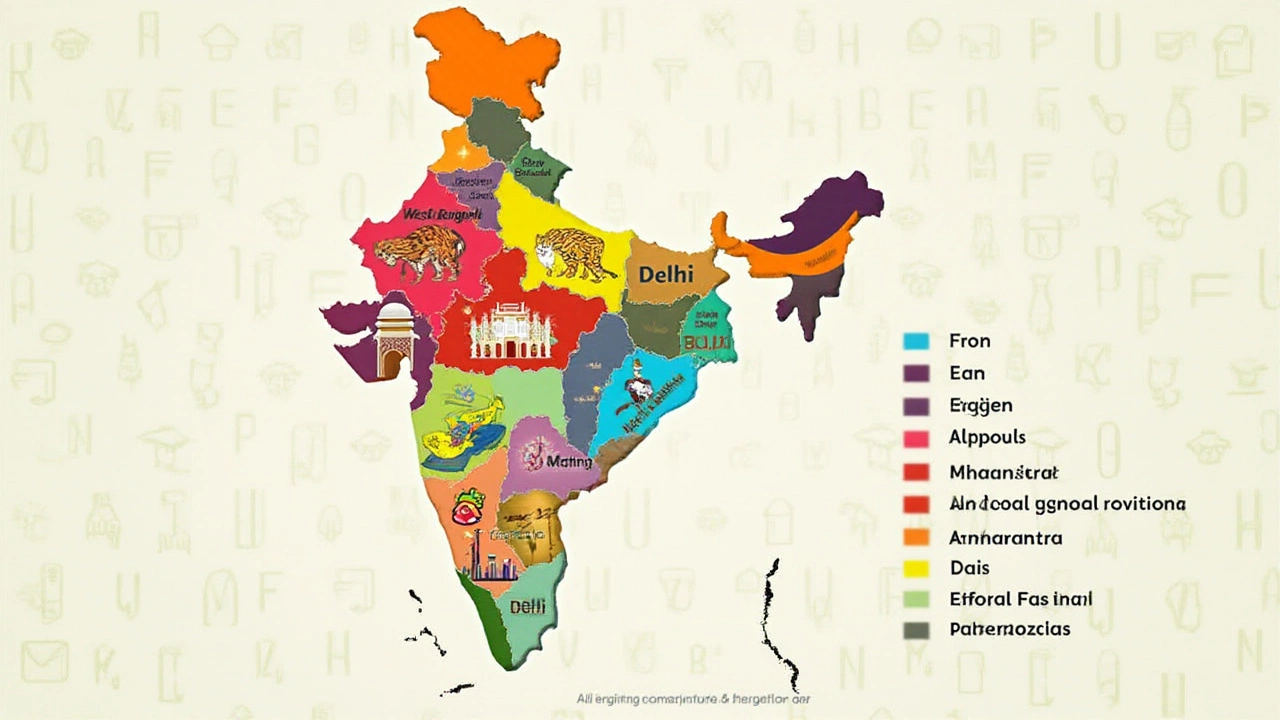India is a mosaic of languages, presenting a remarkable diversity that is both enchanting and intriguing. Among these, English holds a unique position as a bridge language offering access to global opportunities. The proficiency in English varies significantly across its states, shaped by a blend of historical, educational, and cultural factors.
The British colonial past has left an indelible mark, continuing to influence the way English is spoken and taught. In modern India, states like Kerala, Karnataka, and Maharashtra are often applauded for their high levels of English proficiency. This has a lot to do with educational policies, the prominence of the IT sector, and the cultural openness in these regions.
While some states naturally excel in English, anyone can make improvements with the right resources and dedication. Understanding the factors that contribute to effective language learning in these states can sprout ideas and motivation for learners across the country.
- Historical Context of English in India
- States With High English Proficiency
- Influence of Education Systems
- Cultural and Economic Factors
- Tips for Improving English Skills
- Future of English Pronunciation in India
Historical Context of English in India
To truly grasp the English proficiency in India, one must journey back to the days when the British set foot on the subcontinent. English was introduced in India during the British colonial era, starting with traders and missionaries trickling in from the West, eventually leading to full-scale administration by the British Crown. India, a hub of cultural and linguistic diversity, adapted to English as a primary mode of communication in formal settings. This adoption was driven by British efforts to consolidate their rule, making English the medium for governance, law, and education.
The establishment of English education was formalized through Lord Macaulay's Minute on Education in 1835, which advocated the formation of an English-educated class that would serve as intermediaries between the rulers and the masses. Macaulay famously stated,
"We must at present do our best to form a class who may be interpreters between us and the millions whom we govern... a class of persons Indian in blood and color, but English in taste, in opinions, in morals, and in intellect."These policies laid the groundwork for institutions that would teach English to the Indian populace, eventually leading to a legacy of English-medium education that persists to this day.
Over the years, the English language has permeated various layers of Indian society, becoming a marker of modernity and intellectual prowess. Following India's independence in 1947, English remained an official language of the country alongside Hindi, aiding in unifying the nation while also facilitating international diplomacy and trade. The language's role evolved as a means to transcend regional language barriers and as a critical skill in the burgeoning sectors of business and technology.
The linguistic landscape in India is diverse, with English often co-existing with other native languages, thanks to the cultural and social influences each state harbors. States such as Tamil Nadu and West Bengal boast long-standing traditions of English education, stemming from their early exposure during colonial times. The presence of missionary-run schools in states like Kerala further contributed to the spread of English proficiency. NGOs and educational initiatives have continually supported this trend by promoting English learning across different ages and demographics.
Today, English enjoys the status of a co-official language, and its relevance is reinforced by the economic boom in IT and global outsourcing industries where language skills are integral. Cities like Bengaluru and Hyderabad have emerged as cosmopolitan centers where English serves as the lingua franca amidst workplace environments and social settings. The historical roots of English within the Indian subcontinent have undeniably laid the foundation for its current status as a key societal and professional asset. With a multitude of English-language media outlets and literature originating from India, the legacy of English continues to shape the nation's educational and cultural journeys.
States With High English Proficiency
Across India, some states stand out for their impressive English proficiency, which is an essential skill in this increasingly globalized world. Kerala, known for its 100% literacy campaign and robust educational infrastructure, often tops the list when it comes to English proficiency. The state has a historical engagement with English due to its spice trade history and educational missions. This historical context is mirrored in its schools, where English is introduced at an early age, leading to a higher fluency rate among its citizens.
Another state that exhibits strong English language skills is Karnataka, largely due to its vibrant IT hub, Bangalore. As the Silicon Valley of India, Bangalore attracts a multitude of international companies and professionals, necessitating a workforce proficient in English. The prevalence of English in business and technology sectors in Karnataka encourages educational institutions to prioritize English proficiency, making it a primary medium of instruction in schools and colleges.
Maharashtra, particularly its capital Mumbai, is yet another state where English proficiency is markedly high. Mumbai is India's financial powerhouse, hosting a large number of multinational companies. The cosmopolitan nature of the city, coupled with its position as a cultural melting pot, drives the need for a common language like English. This demand has led to widespread usage of English in media, entertainment, and education.
According to a study by the British Council, "The demand for English in India is increasing rapidly, and states like Maharashtra and Karnataka are at the forefront of this linguistic wave."
Beyond the metropolitan areas, states in the North-East, such as Nagaland and Mizoram, also show a surprising level of English proficiency. The moderate influence of Western education systems during colonial times, paired with the presence of missionary schools, has contributed to high English usage among the populace. While many would not immediately associate these regions with English fluency, their education systems ensure quality language education from primary levels.
To illustrate the diversity and diffusion of English proficiency, some metrics are revealing. According to the Education First English Proficiency Index, which assesses the overall English skills in various regions, Kerala, Maharashtra, and Karnataka consistently rank high, showing the effectiveness of their educational policies. Data from this index provides a glimpse into how these states are preparing their students for global communication.

Influence of Education Systems
India's education system plays a crucial role in shaping English proficiency across its vast landscape of states. One of the key factors distinguishing states with high English-speaking populations is the emphasis placed on English education during formative schooling years. In many Indian states like Kerala and Karnataka, the early introduction of English as a medium of instruction greatly enhances English proficiency. Kerala, celebrated as having one of the highest literacy rates in India, owes its success partly to an education policy that integrates English medium instruction from an early age.
Another significant influence stems from the type of schools prevalent in these states. For example, Bengaluru in Karnataka is known for its numerous international schools, where English is not just taught as a subject but is the primary language for all communication and instruction. These institutions often follow global curricula such as the International Baccalaureate (IB) and Cambridge, which prioritize English mastery alongside academic excellence. This exposure paves the way for students to become comfortable and fluent in the language, as they interact in English both inside and outside the classroom environment.
The Central Board of Secondary Education (CBSE) is a popular education board in India which also contributes to this narrative. States that predominantly follow the CBSE curriculum tend to showcase better language skills. The Board's syllabus includes comprehensive English language and literature components that are designed to develop critical thinking and communication skills in students. This system supports students through a structured approach which ensures a strong foundation in English by the time students graduate from high school.
Role of Higher Education Institutions
States recognized for their excellent higher education facilities, such as Maharashtra and Tamil Nadu, also see a trickle-down effect in terms of English proficiency. Universities in Mumbai, Pune, and Chennai offer a myriad of courses that require English fluency, encouraging students to refine their skills in order to succeed. College environments foster greater interaction in English, given the diverse student body coming from various regions and even countries. This melting pot of cultures inherently pushes students towards proficiency to effectively navigate both social and academic demands.
Many educational institutions in these areas have robust ties with foreign universities. This not only enriches their curriculum with international insights but also fortifies the emphasis on English as a lingua franca of academia and industry. Such collaborations often mandate coursework, assignments, and even thesis work to be crafted in English, honing the students’ language skills further and preparing them for global opportunities.
"Education is the most powerful weapon which you can use to change the world," said Nelson Mandela. In India, the power of education is evident in how certain states empower their students with exceptional English-speaking abilities, heralding better socio-economic outcomes.
Acknowledging these educational dynamics can provide valuable insights for individuals aiming to improve their English capabilities. By understanding the effective systems and methods employed in states with high language proficiency, one can draw actionable strategies that can be applied elsewhere, helping bridge linguistic gaps and maximizing opportunities on a global stage.
Cultural and Economic Factors
In India, the intersection of culture and economy has a profound impact on the use of English, shaping both accessibility and proficiency. Take Kerala, for instance. The state's high literacy rate plays an integral role, underpinned by a culture that values education deeply. English is often introduced early in school curricula, building a solid foundation for language skills. Coupled with the desire for global connectivity given Kerala's significant diaspora, this creates a natural inclination towards mastering English.
Moving to Karnataka, the bustling city of Bangalore showcases the influence of economic factors. Often dubbed as the 'Silicon Valley of India', Bangalore's tech boom propels English proficiency. The IT industry demands a workforce adept in English, encouraging widespread use and betterment of language skills among locals. The blend of local culture and international work environments stimulates linguistic growth, turning the city into a melting pot of languages where English often serves as the lingua franca.
Maharashtra, especially Mumbai, highlights another facet where culture meets economy. With its cosmopolitan lifestyle and status as the financial heart of India, English serves as a common language amidst diverse communities. The media industry in Mumbai, including Bollywood, intricately intertwines language skills with culture, as English is frequently used alongside Hindi in films, advertising, and public relations.
According to a report from the British Council, "Maharashtra demonstrates the importance of multilingualism, where English thrives alongside regional languages, fostering a vibrant social and economic ecosystem."
In contrast, states in Northern India like Uttar Pradesh, face challenges despite substantial economic activities. Cultural norms and education policies traditionally focus on Hindi, which can limit English exposure. However, recent developments in e-commerce and global outreach businesses are driving a transformation, encouraging more English learning initiatives.
Finally, it’s worth noting the impact of tourism in areas like Goa, where frequent international interaction necessitates strong English proficiency. Here, the economy is directly tied to the ability to communicate with visitors, making English a pivotal skill for economic success.
| State | Primary Economic Influence | Impact on English Proficiency |
|---|---|---|
| Kerala | High literacy, global diaspora | Enhanced English education and usage |
| Karnataka | IT sector, international exposure | Increased professional English skills |
| Maharashtra | Media and finance hubs | Widespread command of English |
| Goa | Tourism | Essential English proficiency for tourism |

Tips for Improving English Skills
Mastering the art of English, like any other language, requires a blend of dedication, frequent practice, and a bit of playfulness. Unlike the rigidity of mechanical learning, language thrives on creativity and diverse interactions. One of the primary steps to bolster your language prowess is immersing yourself in an English-rich environment. This includes consuming English media such as books, movies, and podcasts, but with an inquisitive mindset. Whenever an unfamiliar word or phrase shows up, make it a habit to jot it down and look it up later. This acts not only as a technique to expand your vocabulary but also as an exercise in contextual learning, which often proves more effective than rote memorization.
Writing frequently is another robust method of fostering improvement in English. Start a diary or blog, which demands you to articulate your thoughts and reflections daily. This form of writing drill aids in internalizing grammar and structure far more naturally than traditional exercises. Engage with writing communities or platforms that provide feedback, which is crucial for growth. According to a study by the Journal of Linguistic Awareness, 'Feedback in shared community platforms not only enhances grammatical precision but also builds confidence in learners.' These communities offer a treasure trove of insights from diverse English speakers, each bringing their idiomatic beauty and regional flair to the table.
Engage in conversations with native or proficient English speakers whenever possible. Virtual language exchange forums can connect you with speakers around the world, allowing you to hone your speaking abilities through real-time practice. Conversations offer a rare chance to learn pragmatic usage, tone modulation, and the subtleties of dialogue that often miss the pages of formal textbooks. When speaking, focus on clear pronunciation and the cadence of sentences. This greatly influences how effectively you are understood and can transform how you engage with the language. With a little patience and persistence, what may seem like a foreign tongue can become second nature.
Utilizing technology can be your secret weapon in improving your English skills. Language learning apps like Duolingo, Rosetta Stone, or Babbel are designed to offer personalized learning paths that can adapt to your pace and style. Many apps now incorporate AI to tailor lessons specific to your strengths and weaknesses. These platforms encourage interaction with English through quizzes, games, and even voice input, bridging the gap between casual learning and structured education. The combination of traditional learning complemented by technology-driven methods makes for a balanced and effective approach to language acquisition.
Attending workshops or enrolling in an English language course can provide structured learning, benefitting from expert guidance. Courses often simulate immersive experiences, facilitating interactions and discussions in English, a critical aspect often missing in self-study routines. Instructors often employ strategies to practice reading comprehension, oral communication, and phonetics, equipping learners with a well-rounded understanding of English. India's diverse pool of English tutors, particularly in cities known for their high English proficiency like Bangalore and Mumbai, can be an invaluable resource. These educators offer tailored programs that correct your weaknesses and build on your strengths.
Finally, remember the importance of setting realistic goals and monitoring progress. Aim for milestones that challenge you but are attainable, keeping you motivated and aligned on a path of continuous improvement. One effective way is to keep track of small wins, such as holding a five-minute conversation or flawlessly delivering a presentation. Reflecting on these achievements fosters a sense of accomplishment and drives further learning. Embracing the journey with an open mind and a curious spirit will make learning English not just an educational pursuit but a delightful adventure.
Future of English Pronunciation in India
The evolution of English pronunciation in India uniquely reflects a country that straddles cultural and linguistic poles. Unlike standardized English accents found in smaller, homogenous populations, India's diverse backdrop shapes countless shades of pronunciation. Many English speakers across Indian states infuse their native phonetic qualities, resulting in a rich tapestry of accents. Yet, there is a discernible movement toward a more neutral, globally comprehensible accent driven by globalization and technological advancements.
The rise of English proficiency programs in educational institutions across India aims to fine-tune these pronunciation variances. Institutes often collaborate with international entities to incorporate global standards of public speaking and business communication into their curricula. Exposure to media, through platforms like Netflix and YouTube, introduces young Indians to different English dialects worldwide, naturally influencing their speech patterns. Interestingly, this exposure prompts a blending of traditional Indian English with more neutral, internationally palatable accents.
Modern technology plays a pivotal role, shaping the way Indians articulate English. Voice recognition tools and language learning apps leverage AI to provide real-time pronunciation feedback, assisting learners in identifying and rectifying deviations from widely accepted norms. For businesses, employees with strong English communication skills are invaluable assets. Consequently, an increasing number of corporations invest in accent neutralization programs, aligning team members to handle international clientele effectively.
The future of English pronunciation in India does not merely hinge on educational reforms but also on societal trends. Young Indians frequently converge in urban centers, encouraging cross-linguistic dialogues. Such interactions create fertile ground for new phonetic patterns to emerge. Given the economic pull, more individuals choose to master an accent that's both intelligible and professional, elevating their competitive edge in the workforce. In popular culture, Bollywood and regional cinema frequently showcase characters with embellished English accents, further popularizing the concept of clear and correct pronunciation.
The widespread use of digital communication tools like WhatsApp and Zoom has also brought nuances in pronunciation to the fore. They've driven the demand for clarity in voice communication, emphasizing the necessity of precise articulation. Although rooted deeply in local flavor, Indian English is bound to gravitate towards a universally accepted dialect. However, it's essential to note that language evolution intrinsically involves retaining cultural identity alongside adopting new norms. Whether English will shed its Indian vestiges entirely remains a question of balance between assimilation and authenticity.
The future seems to hold a hybrid model, blending India's linguistic signature with globally accepted standards. According to a report by EF Education First, based on particular metrics from 2023, India ranks 50th in the world regarding English proficiency. This marks a significant improvement and indicates an openness to evolve further. As linguistic ambassador David Crystal notes, "English has a remarkable ability to adapt to new cultural nuances while maintaining its core comprehension."
English, as a lingua franca, will gradually see the development of an Indian brand of pronunciation unique yet universally understandable, progressively evolved through a mixture of necessity, exposure, and inherent linguistic creativity.

